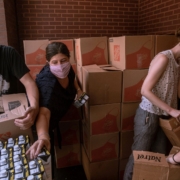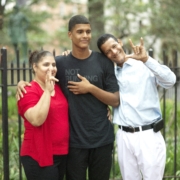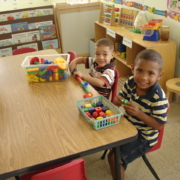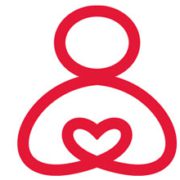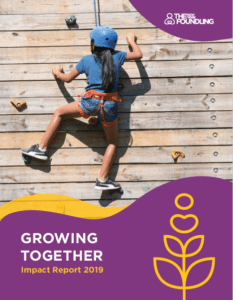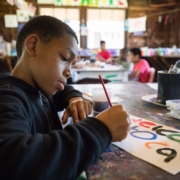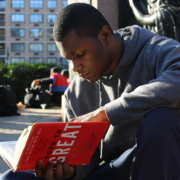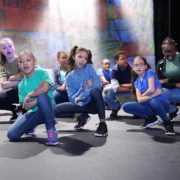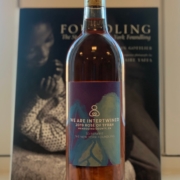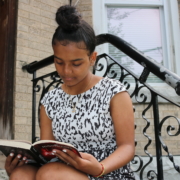New York Times reporter Eliza Shapiro profiles how Mott Haven Academy helped their students throughout the COVID-19 pandemic. Shapiro shares with readers how “Jessica Nauiokas, Mott Haven’s principal, spent the first few weeks of the lockdown figuring out how to get cash and food into the homes of the school’s most vulnerable children, so that they could eventually focus on their studies.” The article includes a quote from a parent who shared, “there were a lot of times I wanted to give up because it was too much for me” and “had it not been for Mott Haven, ‘I probably wouldn’t have home-schooled. I probably would have skipped it.'” READ MORE
For over 150 years, The New York Foundling has worked in partnership with our neighbors to ensure that everyone can meet their full potential when facing challenging situations. This hasn’t changed, and our staff continue to provide life-changing and meaningful support in light of the COVID-19 pandemic. This series shares how The Foundling’s many programs are responding to the needs of their community.
Since 1982, The Foundling has been the only specialized provider of family support and prevention programs that serves the Deaf or Hard-of-Hearing community in all five boroughs of New York City The Foundling’s Family Services for Deaf Children and Adults helps keep children out of foster care by strengthening the family system and increasing access to available community supports. All of our therapists and interventionists are fluent in American Sign Language (ASL), and pre-COVID-19, they met with families in their homes and in their communities.
Since the onset of COVID-19, our team has been helping families overcome the hurdles that followed, ensuring that they stayed on their continued path to family stability.
The Foundling’s Family Services for Deaf Children and Adults is supported by 11 staff members, including therapists, interventionists, supervisors, and an interpreter. Since March, home visits shifted to videoconference – using platforms like videophone devices that simultaneously transmit and receive both audio and video signals over telephone lines, or online solutions like Zoom or Microsoft Teams. These weekly sessions run for 45 minutes or up to an hour and a half, depending on each family’s needs.
“We’re used to meeting in person,” says Diana Abayeva, a program interventionist. “It was a hard transition at first, because some of our families didn’t have smartphones or cellular reception. But thankfully we were able to resolve these technology issues.”
“Our families are managing just like the rest of us,” adds Diana. “Homeschooling their children on top of their parental and work duties or finding childcare when daycare was closed—it’s a challenge. And they want to get this right.”
“Some have reported loneliness and frustration at home, particularly when family members they’re quarantined with don’t know sign language,” therapist Kenya Bryant says.
That’s why program staff are working with the families to improve their communications skills and encouraging family members to learn American Sign Language. “And it’s working,” Kenya continues. “It’s bringing families closer together.”
Families have used this time to pick up new hobbies, and they’re reporting a heightened focus on practicing self-care at home.
And practicing self-care is needed: the virus has posed unique challenges to the Deaf and Hard-of-Hearing community. “One of the downsides to our families’ ability to communicate during the pandemic is that people are wearing masks,” Diana explains. “Many people who are Deaf or Hard-of-Hearing rely on reading lips, but this is not possible with the speaker is wearing a mask. This hinders their ability to be independent.”
As an alternative, some Deaf and Hard-of-Hearing prefer to communicate in writing using the Notes app on their smartphones.
Another challenge revolves around doctor’s appointments. One family needed mental health services for their child, but the provider only conducted telehealth sessions through an encrypted videoconference platform. While the child logged into that platform, their mother, who is Deaf, had to join separately via videophone. She had a hard time keeping track of who said what across the different platforms during the appointment. Not being able to know what the doctor said about her child’s health—or what her child was saying about their own health—was incredibly emotional and frustrating. “I talked to the provider and convinced them to switch to Zoom and hire an interpreter to join the sessions to the conversation for the mother,” says Diana. “That worked out so much better.”
Getting credible and reliable news resources can be another challenge. “We have been directing them to vloggers and reporters who use sign language when posting daily news,” Kenya says.
In response to COVID-19, families have received donations such as household items, electronic devices for communication and remote learning, clothing, and money to purchase food. “We are doing everything we can to help get them through a tough time,” says Diana.
To learn more about how The New York Foundling is responding to the COVID-19 pandemic in New York, visit our emergency response page. Stay tuned for more stories from the frontlines as we continue to support our neighbors on paths to stability and strength.
Read past posts in the ‘Our Work Continues’ blog series:
- Making a Difference in Early Childhood Education
- Camp Felix at Home Keeps Camp Magic Alive this Summer for Foundling Kids
- Keeping Students in Foster Care on Track for Educational Success
- Rehabilitating Youth and Families with Alternatives to Incarceration
- Closing the Achievement Gap for Youth in Foster Care
- Community Services Keep Staten Island Families Connected
- Perseverance and Compassion in our Homes for Adults with Developmental Disabilities (Part 2)
- Perseverance and Compassion in our Homes for Adults with Developmental Disabilities (Part 1)
- School Based Mental Health Services still Mitigating Crises
- Bringing Day Habilitation into the Homes of People with Developmental Disabilities
- Foster Care Systems Supporting Families Despite Social Distancing Challenges
- Supporting Youth as they Age out of Foster Care
- Preventing Child Abuse for Families in Social Isolation
- Mobilizing a School to Support a Community
For over 150 years, The New York Foundling has worked in partnership with our neighbors to ensure that everyone can meet their full potential when facing challenging situations. This hasn’t changed, and our staff continue to provide life-changing and meaningful support in light of the COVID-19 pandemic. This series shares how The Foundling’s many programs are responding to the needs of their community.
In Puerto Rico, The Foundling serves 1,500 children through Head Start and Early Head Start programs. Our Early Head Start program is home-based and serves expecting mothers, infants, and toddlers. The program promotes strong parent-child relationships and helps provide high-quality early learning experiences. Our Head Start program delivers high-quality early education and child development services to children ages 3-5 in San Juan, Cataño, Vega Alta, Coamo, and Toa Baja.
The families and Foundling staff in Puerto Rico have shown tremendous resilience and perseverance, despite the devastation caused by the 2017 hurricanes, a series of earthquakes at the start of 2020, and now, ongoing hardship as families try and stay safe and healthy during the COVID-19 pandemic.
In response to devastation caused by hurricanes in 2017 and earthquakes in 2020, The Foundling’s Early Head Start and Head Start programs in Puerto Rico were already accustomed to delivering services in new and creative ways when COVID-19 hit. “How school and teaching is conducted here changed after Hurricane Maria,” says Carmen Villafane, Senior Vice President of the two programs. “We’ve had some practice with online learning and using digital tools.” Throughout the pandemic, our teachers have become more and more creative with their teaching methods. They’re finding new online learning and practice programs for students. They’re posting instructional videos on how to do the day’s activities, and they are recording videos of themselves reading stories and sending them to the families.
Since schools in Puerto Rico have been closed since March due to the pandemic, teachers and staff have also been sending care packages to students and their families with materials including scissors, paper, pencils, markers, glue, crayons, and other craft materials. That way, when teachers assign activities and projects to do, the families are able to complete them. “Without these materials, the children would lose the crucial skills they need to progress to the next step in their education,” Carmen explains. “So, we’re doing everything we can prepare them and ensure that nothing stands in their way of educational success.”
Activities are geared towards promoting children’s cognitive, social, and emotional growth for later success in school. The program delivers developmentally, culturally, and linguistically appropriate learning experiences in language, literacy, mathematics, social and emotional functioning, science, physical skills, and creative arts.
Teachers host a weekly virtual class and support activities throughout the week. In addition to engaging children and parents, other members of the household are welcome to join as well. During this time together, everyone is able to participate in activities such as songs, stories, and crafts, as well as teacher-guided discussions about COVID-19 and general health and safety measures. “Off-screen, the parents have done a wonderful job working with their children on educational activities,” Carmen commented. For example, teachers will recommend an activity for parents to work on with their children at home, such as making homemade Play-Doh or “Plastilina,” and the parents will share their videos of family craft-time with the teachers.
Early Head Start, which provided home-based services to 36 families before COVID-19, is now held online. Vocational home visitors, who work with a child’s family to ensure their home environment supports their well-being and education, are trained to identify family needs in both online and in-person settings. They develop programming, handle assessments, and if a need arises that requires specialized care, they provide referrals to nurses, social workers, mental health professionals, or other community resources.
Throughout the year, and especially in times of crisis — be it a hurricane, an earthquake, or a global pandemic — the families served by our Head Start programs often struggle to have their basic needs met. “Food is too often in short supply,” Carmen notes, “It’s a common challenge our families face. But with the help of local charities and generous donations, we have been able to buy and supply grocery bags full of food to the families we serve.”
“I am so proud of my employees,” Carmen adds, “They have all gone the extra mile, which is what we need in this moment, and what we’ve needed in every moment since Hurricane Maria. Earthquakes still affect south Puerto Rico every day, and there’s no end in sight. And yet, despite the uncertainty, our staff wakes up every morning prepared and ready to serve. I couldn’t be more proud of them for their hard work and continued commitment. The Foundling’s presence here in Puerto Rico really makes all the difference.”
To learn more about how The New York Foundling is responding to the COVID-19 pandemic in New York, visit our emergency response page. Stay tuned for more stories from the frontlines as we continue to support our neighbors on paths to stability and strength.
Read past posts in the ‘Our Work Continues’ blog series:
- Camp Felix at Home Keeps Camp Magic Alive this Summer for Foundling Kids
- Keeping Students in Foster Care on Track for Educational Success
- Rehabilitating Youth and Families with Alternatives to Incarceration
- Closing the Achievement Gap for Youth in Foster Care
- Community Services Keep Staten Island Families Connected
- Perseverance and Compassion in our Homes for Adults with Developmental Disabilities (Part 2)
- Perseverance and Compassion in our Homes for Adults with Developmental Disabilities (Part 1)
- School Based Mental Health Services still Mitigating Crises
- Bringing Day Habilitation into the Homes of People with Developmental Disabilities
- Foster Care Systems Supporting Families Despite Social Distancing Challenges
- Supporting Youth as they Age out of Foster Care
- Preventing Child Abuse for Families in Social Isolation
- Mobilizing a School to Support a Community
New York, NY (July 16, 2020) – The New York Foundling announces the appointment of two new members to their Board of Trustees. Joining the board are Angelique Sina (Friends of Puerto Rico and Sinabel Group) and Paul Neale (DOAR, Inc).
“We are thrilled to welcome Angelique and Paul to The New York Foundling’s Board of Trustees. Both bring a unique perspective and expertise to our work, and, will continue to help us to grow as an organization. We are looking forward to working alongside them, and to furthering our mission to serve our community,” said Bill Baccaglini, President and CEO of The New York Foundling.
Angelique Sina is a social entrepreneur and President of Friends of Puerto Rico and Sinabel Group. After her career at the World Bank, she launched a multi-million-dollar philanthropic fund to support youth in the aftermath of Hurricane Maria. As part of her efforts, she launched Café Ama, a social impact coffee company that creates a pathway out of poverty for youth in Puerto Rico by teaching them entrepreneurship and farming skills. She is a graduate of the University of Puerto Rico, Johns Hopkins, and Stanford University Business School. “The Foundling is an important bridge for youth and families reaching from New York to Puerto Rico,” said Sina. “I feel fortunate to play a small role in their important mission.”
Paul Neale is the Chairman, CEO and majority shareholder of DOAR, Inc., the leading global consulting firm advising lawyers at top tier law firms and major corporations involved in high-stakes, complex legal disputes. He has over 30 years of experience in litigation consulting and holds a B.A. in Criminal Justice from Temple University.
“The New York Foundling serves the communities and individuals who most deserve and need the amazing support that the organization provides,” said Paul Neale. “The Foundling’s mission and the passion and commitment with which it carries it out are truly inspiring. I’m proud to be a part of such an impactful organization.” Neale also previously served on the board and remains a strong supporter of Hands In 4 Youth (www.hi4y.org), an organization that provides social and educational programs for low-income youth.
About The New York Foundling
At The New York Foundling, we trust in the potential of people, and we deliberately invest in proven practices. From bold beginnings in 1869, our New York based nonprofit has supported hundreds of thousands of our neighbors on their own paths to stability, strength, and independence. The New York Foundling’s internationally recognized set of social services are both proven and practical. We help children and families navigate through and beyond foster care. We help families struggling with conflict and poverty to grow stronger. We help people with developmental disabilities live their best lives. And we help children and families access quality health and mental health services core to building lifelong resilience and wellbeing. For more information about The New York Foundling, please visit www.nyfoundling.org.
2019 was an impressive year for The Foundling – we celebrated our milestone 150th anniversary, expanded many of our core program areas, and witnessed countless moments of achievement among the children, adults, and families we serve.
We are proud to announce Growing Together, our 2019 Impact Report, which illustrates our growth throughout the year – from program expansions to individual successes for thousands of people throughout New York and Puerto Rico.
For over 150 years, The New York Foundling has worked in partnership with our neighbors to ensure that everyone can meet their full potential when facing challenging situations. This hasn’t changed, and our staff continue to provide life-changing and meaningful support in light of the COVID-19 pandemic. This series shares how The Foundling’s many programs are responding to the needs of their community.
The New York Foundling launched Camp Felix in 2008 to provide children in foster care with the magical gift of attending an overnight summer camp filled with sports, games, swimming, making friends, and connecting with others who have experienced trauma and hardship, and know what it is like to be involved in the child welfare system. Campers stay active, nurture their creativity, and connect with nature.
Located an hour north of New York City, Camp Felix has come a long way since its first summer and is now open to children in all of The Foundling’s child welfare programs. Typically, children attend our overnight summer camp for 1 or 2 weeks and immerse themselves in activities that instill feelings of self-confidence, resilience, self-respect, and a strong sense of community. Our campers return home filled with confidence, newfound strength, and the belief that they can “achieve anything.”
COVID-19 has changed what Camp Felix will look like this summer. The group activities and communal settings that define the overnight camp experience would be difficult to adapt to current safety guidelines, and so The Foundling made the decision to cancel 2020’s traditional camp season. The health, wellbeing, and safety of our campers, their families, and Camp Felix staff is too important to risk. However, thanks to The Foundling’s dedicated and creative team, this summer, children and teenagers will experience the magic of Camp Felix at home!
At the beginning of the COVID-19 pandemic, The Foundling had hopes that in-person operation of Camp Felix in August would still be possible – but as things progressed and the world changed, team knew they had to begin planning a virtual program instead. “The kids need this camp,” says Jane Feyder-Siegel, the camp’s Program Director. “It was always our back-up plan to run it online if we couldn’t do it in-person.”
With the support of our partner The Felix Organization and generous funders, Camp Felix At Home will deliver high-quality, interactive camp-themed programming supervised by veteran Camp Felix staff members throughout the month of August. The virtual camp experience will feature 2-3 hours of daily activities, including fitness, yoga, arts and crafts, theatre and dance, STEM workshops, musical performances, and more. Virtual campers can participate in the entire program start to finish, or they can choose select weeks, days, or activities based on their interests.
“When we told kids and caretakers that we were still going to run Camp Felix, it was a great relief to them,” Jane continues “Children and families look forward to camp all year long. It’s a real get-away for them and an opportunity for them to be carefree kids.”
At first, planning a virtual camp was daunting. “But we put our heads together, got creative, and we’re really excited about what we’ve come up with.”
While some activities like swimming, rock climbing, and basketball can’t be adapted to an online platform, many other camp favorites will return. Each day will still start with the Morning Circle where campers and staff sing songs and talk about daily and weekly goals and challenges. “We can’t give out a Cleanest Cabin Award this year, so instead campers will be competing within their own homes to see who can complete the most household chores—things like dusting, vacuuming, doing the dishes, or helping their parent/guardian with dinner.”
A week before Camp Felix At Home begins, campers will receive a care package, including a t-shirt, journal, set of headphones, snacks, coloring and activity books and supplies, arts and crafts supplies, and a frisbee.
The camp’s programming will allow campers to pursue a variety of interests. STEM workshops provided by Engineering for Kids will enable campers to explore cyber robotics, parachutes, and candy catapults. Musical theater workshops, led by Broadway Bound Kids and based around routines from Hamilton and The Lion King, will teach campers to project their voices and develop their stage presence. Acting workshops from Boston Casting will offer improv and stand-up comedy instruction.
“There will be a lot of trial and error with Camp Felix At Home, but the kids are excited and open-minded; and families love that we are still finding a way to come together and do something special,” Jane says. “Parents and foster parents want their kids to spend the summer doing fun, productive activities, and exploring new passions and hobbies, albeit remotely.”
To learn more about how The New York Foundling is responding to the COVID-19 pandemic in New York, visit our emergency response page. Stay tuned for more stories from the frontlines as we continue to support our neighbors on paths to stability and strength.
Read past posts in the ‘Our Work Continues’ blog series:
- Keeping Students in Foster Care on Track for Educational Success
- Rehabilitating Youth and Families with Alternatives to Incarceration
- Closing the Achievement Gap for Youth in Foster Care
- Community Services Keep Staten Island Families Connected
- Perseverance and Compassion in our Homes for Adults with Developmental Disabilities (Part 2)
- Perseverance and Compassion in our Homes for Adults with Developmental Disabilities (Part 1)
- School Based Mental Health Services still Mitigating Crises
- Bringing Day Habilitation into the Homes of People with Developmental Disabilities
- Foster Care Systems Supporting Families Despite Social Distancing Challenges
- Supporting Youth as they Age out of Foster Care
- Preventing Child Abuse for Families in Social Isolation
- Mobilizing a School to Support a Community
For over 150 years, The New York Foundling has worked in partnership with our neighbors to ensure that everyone can meet their full potential when facing challenging situations. This hasn’t changed, and our staff continue to provide life-changing and meaningful support in light of the COVID-19 pandemic. This series shares how The Foundling’s many programs are responding to the needs of their community.
At The New York Foundling, we see education as the pathway to independence. All of our programs lay the groundwork for healthy development, wellbeing, and self-determination by teaching critical life and learning skills. Youth in foster care face especially significant challenges in their lives that contribute to notably lower academic performance, from reading and math standardized test scores, to school attendance, to high school graduation rates, to college enrollment and graduation.
The Foundling’s Road to Success program, an innovative long-term, one-on-one tutoring program for youth in foster care with The Foundling, is designed to support young people in foster care in reaching their full academic potential. Road to Success goes above and beyond the expectations of a typical tutoring program by providing true mentorship to students and working closely with families in a coordinated effort to improve academic achievement.
Since March, Road to Success program tutors have worked diligently to ensure students stay on track for educational success and don’t fall behind in the wake of the disruptions and challenges caused by COVID-19.
When COVID-19 hit New York City, all students were asked to shift into remote learning immediately and for the near future. For underserved communities – including young people in foster care – securing access to technology and navigating the new classroom process posed significant challenges. For the young people in our Road to Success program, they had a special support on their side – our Road to Success tutors. “We spent the better part of March and April securing the equipment and resources needed to provide every student with the tools they needed to succeed—and that wasn’t easy,” shares Joni Rivera. As Assistant Vice President of The Foundling’s Educational Services, Joni oversees a number of educational support programs, including Road to Success.
“One of our students, for example, is visually impaired and needed a specialized device and software to be able to do her work,” Joni elaborates. “We hounded her school until they finally got her what she needed. The good news is that with the right technology, staff support, and the student’s perseverance, she’s still slated to graduate high school this summer.”
While the New York Department of Education promised to provide iPads for all the students enrolled in its public schools, not every student in Road to Success received one during the initial distribution—even though the State tried to prioritize children in child welfare. “We had to provide our students with that technology on our own,” Joni explains. “Thankfully, we received generous donations and were able to purchase iPads for the rest of the students who needed them.”
Once students had secured technology access, the tutors of Road to Success were able to get students back on track for educational success. Like many students making the transition to remote learning, our Road to Success participants experienced expected challenges like time management skills and a need for increased digital literacy, but our participants also continued to other challenges unique to youth in foster care.
“Our tutors do a lot of advocacy work on behalf of our students,” Joni explains. Because of COVID-19-related shutdowns—along with a lack of access to scanners and printers—applying for college has been especially difficult for many of the college bound students in the program. Young people in foster care face some of the lowest college enrollment rates in the nation, so enabling our participants to apply to and matriculate into college is one of the most important roles that our Road to Success program has. Some problems with application submissions have been easier to solve than others—such as installing scanner apps on student phones—but compiling the required financial documentation has been very challenging.
“When our students fill out the Free Application for Federal Student Aid (FAFSA) and their college applications, they need to prove their ‘non-tax-filer’ status to the school,” Joni explains. “Even within the SUNY and CUNY school systems, there’s no standardized way to do this. Each college campus has their own set of hoops to jump through.” Proving this status is critical to securing financial aid, and to completing every application.
Joni continues, “Pre-COVID, students would get verification documentation from the IRS, but since the outbreak, the IRS’s offices have been closed. You can’t call them. You can’t email them. There’s no way to complete the process online. It took a lot of phone calls from our staff about multiple students, but SUNY and CUNY finally agreed to accept letters from caseworkers as an alternative.”
“I can’t even imagine kids doing this on their own without support,” Joni adds. “It’s been difficult enough as it is for us, and we’re adults who’ve been trained to do this work. It’s just crazy to think about how many students in foster care, who don’t get the kinds of support we provide, must be falling through the cracks right now. Now more than ever, I think it’s really important to highlight the need for educational advocacy and tutoring in the foster care space.”
To learn more about how The New York Foundling is responding to the COVID-19 pandemic in New York, visit our emergency response page. Stay tuned for more stories from the frontlines as we continue to support our neighbors on paths to stability and strength.
Read past posts in the ‘Our Work Continues’ blog series:
- Rehabilitating Youth and Families with Alternatives to Incarceration
- Closing the Achievement Gap for Youth in Foster Care
- Community Services Keep Staten Island Families Connected
- Perseverance and Compassion in our Homes for Adults with Developmental Disabilities (Part 2)
- Perseverance and Compassion in our Homes for Adults with Developmental Disabilities (Part 1)
- School Based Mental Health Services still Mitigating Crises
- Bringing Day Habilitation into the Homes of People with Developmental Disabilities
- Foster Care Systems Supporting Families Despite Social Distancing Challenges
- Supporting Youth as they Age out of Foster Care
- Preventing Child Abuse for Families in Social Isolation
- Mobilizing a School to Support a Community
Haven Kids Rock, the acclaimed musical arts program at Haven Academy, just released a new music video. The video, which features the song ‘Scars,’ stars co-founder Nefertiti Jones and numerous Haven Kids Rock participants.
Each year, The Foundling partners with City Winery to produce an exclusive wine that benefits our community. With a portion of proceeds going directly to support The Foundling, this is an easy way to support the children, adults, and families in our programs, while enjoying a limited-edition summer wine. This year’s offering, We Are Intertwined, is a fine Rosé of Syrah sourced from high-quality Californian terroir.
The wine is available online for purchase here, with free delivery in the New York City area. For $119, you will receive a case: 3 bottles of our custom Rosé and 3 bottles of sparkling Cava (6 total). A portion of your purchase will directly go to The Foundling’s COVID-19 Emergency Response Fund.
At The Foundling, we are committed to providing strength, stability, and hope to our neighbors – and right now, our programs are more important than ever. With your purchase of We are Intertwined, you can join us in providing support to the New York City community during these uncertain times.
For over 150 years, The New York Foundling has worked in partnership with our neighbors to ensure that everyone can meet their full potential when facing challenging situations. This hasn’t changed, and our staff continue to provide life-changing and meaningful support in light of the COVID-19 pandemic. This series shares how The Foundling’s many programs are responding to the needs of their community.
Youth who are tried as adults for crimes committed while under the age of 19 face the very real threat of being sentenced to adult prison with adult convictions that impact their futures. The Foundling’s Families Rising program is one of a select few that targets this high-risk population and provides them with evidence-based Functional Family Therapy (FFT) as an alternative to incarceration.
Families Rising works to reduce family conflict, substance abuse, recidivism, and violent behavior in the long term. In addition to its historically high rates of treatment completion, the program has demonstrated a significant impact helping participants with viable alternatives that avoid incarceration and a criminal record, leading them to stay in school and avoid re-arrest. The program is also estimated to save taxpayers millions of dollars each year in incarceration costs.
Throughout COVID-19, our dedicated Families Rising team has continued to provide FFT treatment and support to youth and their families.
Before youth can be screened into programs like Families Rising, which is a rehabilitative alternative to incarceration, they have to wait for a court referral. With criminal courts closed due to COVID-19, referrals of youth to The Foundling’s Families Rising program have decreased dramatically. Virtual court hearings are at a minimum, reserved only for the highest-risk cases.
But for the many young people who are already enrolled in Families Rising, therapy sessions have continued during COVID-19 but in a telehealth format. “We’ve had more instances of rescheduling,” says Kimberly Sweeney, a Families Rising Supervisor. “Because of COVID-19, we cannot rely on popping up at someone’s home for a session, so we are now addressing potential attendance struggles as a clinical matter in therapy sessions.”
Negative peer influences, fights with family, and impulsive decision-making are the most common trouble factors for youth. “Kids do what other kids are doing,” says Kimberly, “Since other kids are staying home due to COVID-19, the kids we help are, too. So that works to our advantage.”
Family involvement is an incredibly important factor in the program’s success. “One of my kids wasn’t going to school,” Kimberly explains, “But then his older brother came home from college early because of COVID-19. Our client started logging into the remote learning platform and began sending screenshots of the work he was doing to both myself and his school counselor. His brother was such a good influence. He reinforced all the skills and good behaviors we were trying to teach.”
And moments like this one couldn’t happen if youth are tried as adults and put in adult prisons. “Flooding the criminal justice system isn’t going to help kids make better choices, go to school, or improve their family and community relations,” Gomattie states, “It’s not going to fix recidivism.”
“If the risk of punishment at Rikers was enough to encourage people to behave differently, then it would have worked already,” adds Kimberly, “Families need more support addressing maladaptive behaviors, so their kids don’t end up in Rikers.”
“We need more programs like Families Rising—programs that actually address the issues that got the kid arrested in the first place,” Gomattie continues, “If we don’t treat the root causes, how are we going to produce any real lasting results?”
To learn more about how The New York Foundling is responding to the COVID-19 pandemic in New York, visit our emergency response page. Stay tuned for more stories from the frontlines as we continue to support our neighbors on paths to stability and strength.
Read past posts in the ‘Our Work Continues’ blog series:
- Closing the Achievement Gap for Youth in Foster Care
- Community Services Keep Staten Island Families Connected
- Perseverance and Compassion in our Homes for Adults with Developmental Disabilities (Part 2)
- Perseverance and Compassion in our Homes for Adults with Developmental Disabilities (Part 1)
- School Based Mental Health Services still Mitigating Crises
- Bringing Day Habilitation into the Homes of People with Developmental Disabilities
- Foster Care Systems Supporting Families Despite Social Distancing Challenges
- Supporting Youth as they Age out of Foster Care
- Preventing Child Abuse for Families in Social Isolation
- Mobilizing a School to Support a Community

